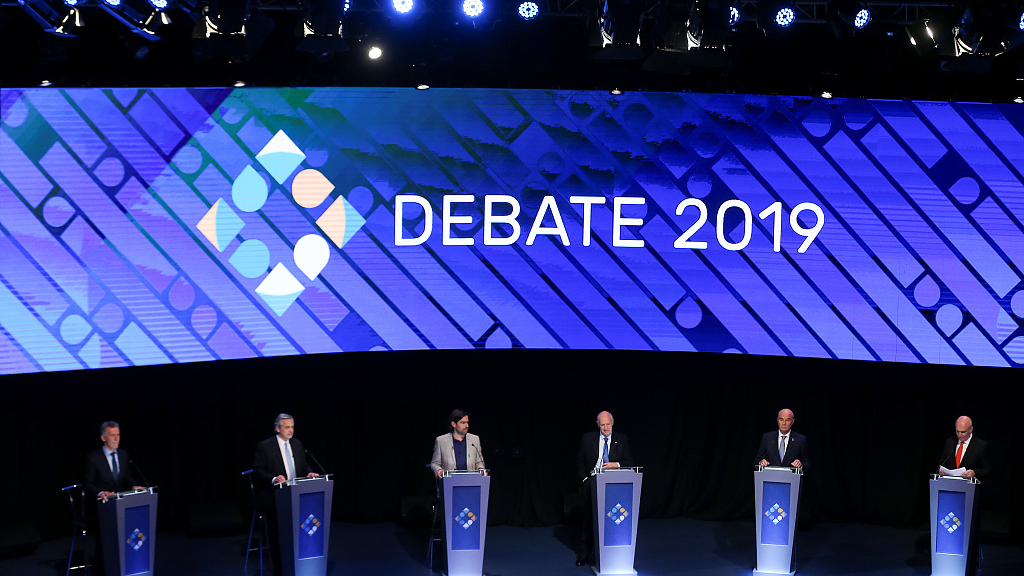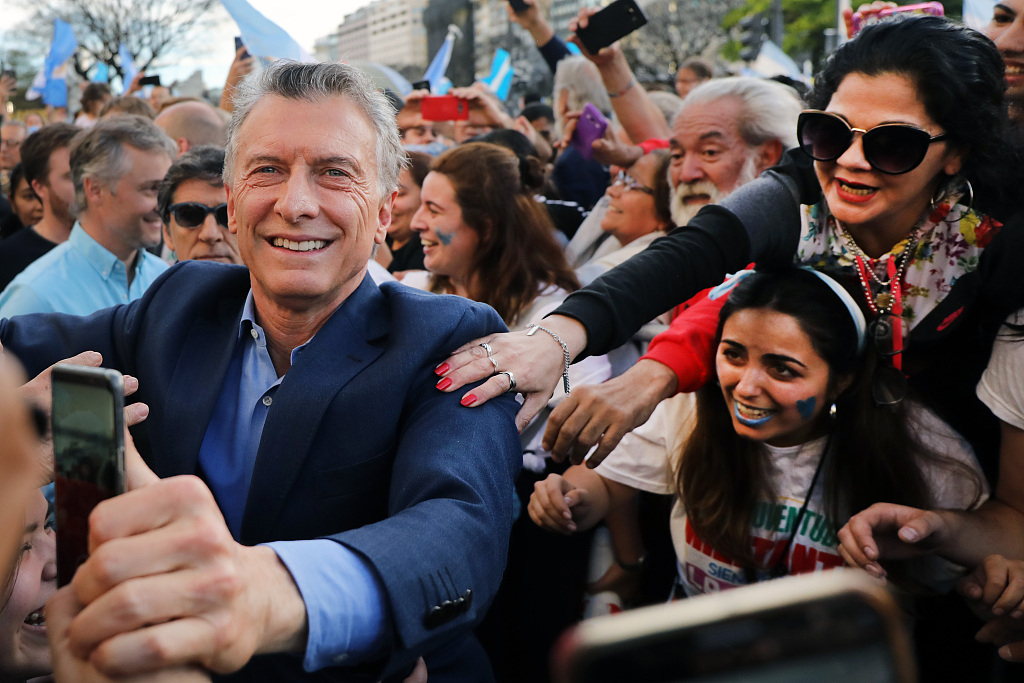
Argentina's presidential candidates participate in a presidential debate ahead of the October 27 presidential election at the University of Buenos Aires' Law School in Buenos Aires, Argentina, October 20, 2019. /VCG Photo
Argentina's presidential candidates participate in a presidential debate ahead of the October 27 presidential election at the University of Buenos Aires' Law School in Buenos Aires, Argentina, October 20, 2019. /VCG Photo
Editor's note: Jiang Shixue is a professor at the Institute of Global Studies at Shanghai University. The article reflects the author's opinions, and not necessarily the views of CGTN.
General elections will take place in Argentina on October 27 to choose the President of the Republic, members of the national congress and governors of most provinces.
The incumbent president Mauricio Macri is running for re-election. But in the primary vote on August 11, he failed to outperform his opponent, Alberto Fernández, a center-left candidate, whose running mate is the country's ex-President Cristina Fernandez de Kirchner. Therefore, it is very likely that Alberto Fernández will win the presidency by a wide margin of votes.
It will not be a big surprise if Macri will be defeated. The economy of the second largest South American country is in worse shape than it was four years ago when Macri inherited it from Cristina Fernández de Kirchner. Inflation is running at 55 percent a year; unemployment rate is in the double digits; the currency has plunged; a large amount of capital has fled the country; the burden of foreign debt is as heavy as 100 billion U.S. dollars; and poverty is widespread.
In June 2018, in order to pull the economy out of the woods, Argentina and the International Monetary Fund (IMF) reached a deal. The IMF would offer a rescue package of 50 billion U.S. dollars, but Argentina should swallow a bitter pill of tightening its belt. Demonstrations erupted thereafter, protesting against the austerity plan.
Therefore, the priority for the new government will be developing the economy. Will it continue to walk along the road of the free market economy paved by Macri, or adopt the so-called Peronist policies, emphasizing the role of the government in economic and social affairs?
As some commentators point out, policies of the new government might be a combination of free market and government regulation, or the Peronist plus 2 style.
In any case, for the time being, it is anybody's guess whether the new government will be able to get rid of the economic recession soon. Hopefully, in the future, Argentina will not cry again.
Externally in foreign policy, no abrupt changes will take place. The new government will continue to maintain good relations with its neighbors, particularly Brazil. But its ties with the U.S. and China might be closely watched by observers.
The U.S. has always considered Latin America to be its backyard. Therefore, many people in the U.S., such as government officials, congressmen, scholars, and the media are showing concern or even jealousy over the rapid development of China-Latin America ties. The message from the Trump administration to Latin America is even blunter: Latin America should disengage itself from China to escape the so-called "predatory lending" or "debt-trap diplomacy."

President of Argentina Mauricio Macri greets supporters as he enters his closing presidential campaign rally at Obelisk in Buenos Aires, Argentina, October 19, 2019. /VCG Photo
President of Argentina Mauricio Macri greets supporters as he enters his closing presidential campaign rally at Obelisk in Buenos Aires, Argentina, October 19, 2019. /VCG Photo
Indeed, unlike some Latin American leaders, President Macri is a pro-U.S. center-rightist. According to U.S. President Donald Trump, he and Macri have known each other for a long time. "I did business with his father in my civilian days," said the U.S. president.
But it does not mean that President Macri has taken sides between the U.S. and China. As a matter of fact, he has been trying his best to promote bilateral relations between Argentina and China. He traveled to Beijing in mid-May of 2017 to attend the Belt and Road Forum for International Cooperation. It was during the meeting with President Macri that Chinese President Xi Jinping said that Latin America is the natural extension of the Belt and Road.
In early 2019, President Macri made an official visit to the construction site of a joint Argentina-China hydropower megaproject, where two hydroelectric dams, Condor Cliff and La Barrancosa, are being erected along the Santa Cruz River in Patagonia. He said the project is "highly important" and "emblematic" in terms of renewable energy and economic development.
According to a survey conducted by the Wilson Center and Poliarquía, a consultancy company, 80 percent of Argentineans favors Chinese investment and 76 percent of Argentineans expresses a positive view of China.
Needless to say, not every person in Argentina thinks alike. It is reported that Eduardo Eurnekián, one of the richest persons in Argentina, asked Alberto Fernández not to lean on China for financial support, but instead stick to the U.S. "Turning our back to the U.S. again and seeking an alliance with China to get funds would be a big mistake," said the 86-year-old billionaire.
It is difficult to understand why Eduardo Eurnekián, as a successful businessman, should have such a narrow mind and wrong perception. But it is easy to predict that Alberto Fernández and Cristina Fernández de Kirchner will not accept the wrong advice. The new government is expected to further promote the bilateral ties with China in trade, investment, finance and other areas on a win-win base following the principle of common consultation, common construction and shared benefits.
In an interview with Página 12, a newspaper published in Argentina, Alberto Fernández said that Argentina does not wish to get involved with "the fight between the U.S. and China." He also promised that he would continue to welcome Chinese investment and expand exports to China.
People should not forget that during her presidency, Cristina Fernández de Kirchner made great efforts to promote the bilateral relations with China. It was during the formal talk between her as President of Argentina and President Xi in Buenos Aires in July 2014, that the two countries would move towards the Comprehensive Strategic Partnership.
It is true that the political orientations of Mauricio Macri and Alberto Fernández are not the same. However, China never cares about ideology in the process of developing its external relations with any country in the world.
Therefore, it can be said that after the completion of the power shift in the Casa Rosada, the Presidential Palace in Buenos Aires, bilateral ties between China and Argentina will continue to move forward.
(If you want to contribute and have specific expertise, please contact us at opinions@cgtn.com.)